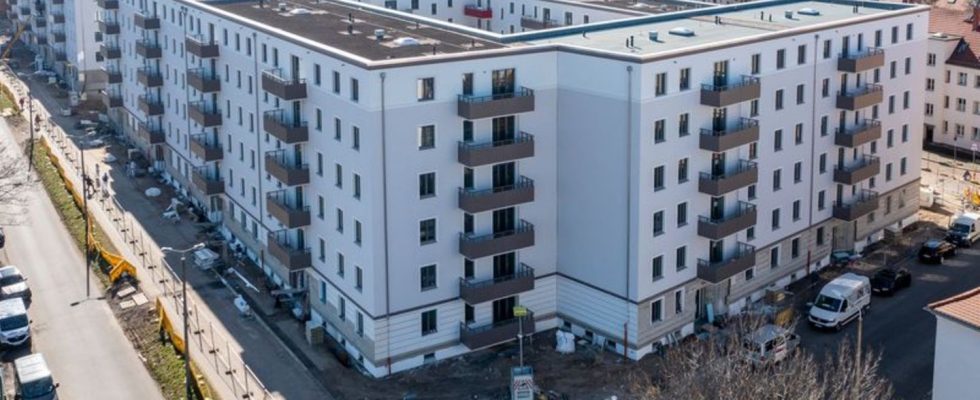Housing policy
910,000 new social housing units are required in Germany
After a certain period of time, social housing can be rented out normally on the market, which is why their number has steadily decreased in recent years. photo
© Jan Woitas/dpa-Zentralbild/dpa
There are currently just over a million social housing units nationwide. One alliance assumes that the number would have to be doubled by 2030. There is a shortage in one federal state in particular.
An alliance of tenants’ associations, construction unions and social and industry associations has called for significantly more apartments for people with low incomes. It warned on Tuesday in Berlin the creation of more than 910,000 social housing, citing a study by the Pestel Institute in Hanover.
Accordingly, there were around 1.088 million social housing units in Germany at the end of 2022. The “Social Housing” alliance assumes that an increase to 2 million social housing units nationwide will be necessary by 2030 – then the level from 2007 would be roughly reached. According to the study, there is a particularly large lack of social housing – in absolute numbers – in Baden-Württemberg (gap: around 206,000 apartments), Bavaria (around 195,000), Berlin (around 131,000) and Lower Saxony (around 109,000).
Demand for a special fund worth billions
The alliance demanded that the federal and state governments immediately provide a special fund worth 50 billion euros to promote social housing. This is the only way to get a little closer to the traffic light target of 100,000 new social housing units per year – so far, on average, around 24,000 new social housing units have been built per year since 2017. The alliance also spoke out in favor of tax reductions: In the future, 7 percent instead of the current 19 percent VAT should be charged for the construction of new social housing.
Rents for social housing are regulated by the state. Only people who the authorities see as having a special need because they have low incomes are allowed to live there. After a certain period of time, the apartments can be rented out normally on the market. Because there hasn’t been enough new social housing for a long time, the bottom line is that their number has been steadily decreasing in recent years.
Traffic light coalition misses housing construction target
Because of the enormous need, especially in the cities, the SPD, Greens and FDP had targeted the construction of 400,000 new apartments annually in their coalition agreement – 100,000 of which would be social housing. Because of the consequences of the war in Ukraine, the government admitted last year that it would initially miss its target. Scarce materials, a shortage of skilled workers and increased interest rates are among the obstacles.
The chairman of the Construction-Agriculture-Environment industrial union, Robert Feiger, accuses the state of “mismanagement” in dealing with social housing. “He prefers to pay rents to landlords – which are often far too high – instead of investing intensively in the construction of social housing,” he said. This caused the state’s social spending to skyrocket. The winners are the landlords who can enforce ever higher rents on the market.
High rent payments, especially in southern Germany
According to information from the study, the state is forced to pay rent that is significantly higher than the typical local rent, especially in regions in Bavaria, Baden-Württemberg, Hesse and Hamburg. The background: For recipients of citizen’s benefit, the state usually covers the costs of accommodation. And if you have a small income, you can apply for a subsidy for your apartment: housing benefit.
The study cites the Bavarian capital Munich as a particularly striking example. Here, the rent paid by the job centers for the accommodation costs was 19.40 euros per square meter – and therefore around 50 percent above the average rent in Munich. Study leader Matthias Günther from the Pestel Institute said: “In the end, the state is vulnerable to blackmail because it has to accept rents that would otherwise not be paid.” The state must invest more in new social housing. This saves him considerable sums that he would otherwise have to spend on rent payments over the long term.

